Super Early Bird Deadline
October 31, 2025
Judging
Date
May 18, 2026
Winners
Announced
June 10, 2026

Sonoma County Winegrowers has established itself as a pioneer in sustainable winegrowing, achieving the milestone of becoming 99% certified sustainable in its vineyards in 2019. Under the leadership of Karissa Kruse, the organization has not only embraced sustainability but has also driven innovation through initiatives like the Sonoma County Center for Ag Sustainability and the "Farm of the Future." In this interview, Kruse shares the challenges faced, the innovations introduced, and the impact of these efforts on the local wine-growing community and the environment.
When we launched our formal commitment to be certified sustainable as a wine region in 2014, one of the biggest challenges was that we were the first organization to ever pursue it. At the time, sustainability was more of a concept, and the set of best practices was not widely talked about or prioritized. We spent a lot of time learning and communicating about what sustainability meant and why it was important. The other challenge was our goal of having all the winegrowers in the county participate. To get adoption, our Board of Directors was the first to go through the sustainability assessment and certification process so they could lead and inspire momentum. Finally, we invested a lot of resources in creating a robust communications process and storytelling for the wine trade and consumers, including developing the popular “sustainably farmed grapes” seal that can be used on a wine label. It was truly a county-wide collaborative effort that led to our success and ability to reach our goal of being the nation’s most sustainable wine-growing region!
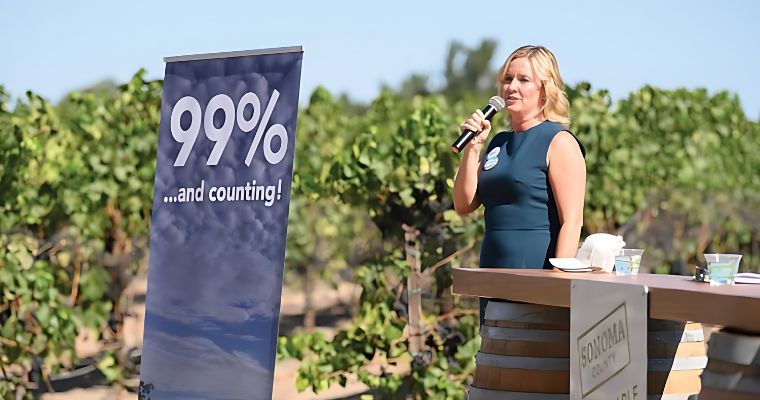
Image: Karissa Kruse talking about achieving 99% certified sustainable for Sonoma County Winegrowers during a news conference in Santa Rosa, Calif.
We are so proud that 95% of our vineyards are family-owned, and many of them are multi-generational, which also means that most of our farmers are from the area and may not have worked in other industries. Both the “Ag Center” and the “Farm of the Future” are initiatives focused on bringing outside thinking into our grape grower and wine community to help us with fresh thinking on how we navigate the challenges in our business and leverage the opportunities. The subject matter experts who have been part of our “AgCenter," which has met annually since 2017, have inspired us to explore collaborations and partnerships as a best practice in our marketing of the wine region. This specifically led to the co-founding of the Healdsburg Wine & Food Experience global event to elevate the brand “Sonoma County” on a global stage and was the motivation for the “Farm of the Future” effort to better understand how partners can support our farmers through innovation and technology. Our “Farm of the Future” initiative has positioned Sonoma County Winegrowers as a living lab for thought leadership and to pilot equipment, technology, and practices that will keep our farmers both sustainable and viable for the next generation. This effort and its call to action have led to partnerships with Wilbur-Ellis on soil health and regenerative farming and with John Deere on piloting their “Smart Apply” precision sprayer to understand the benefits of reducing crop protection material in vineyards. We are creating the model for agriculture long term not just in Sonoma County and wine grapes but also specialty crops around the world.
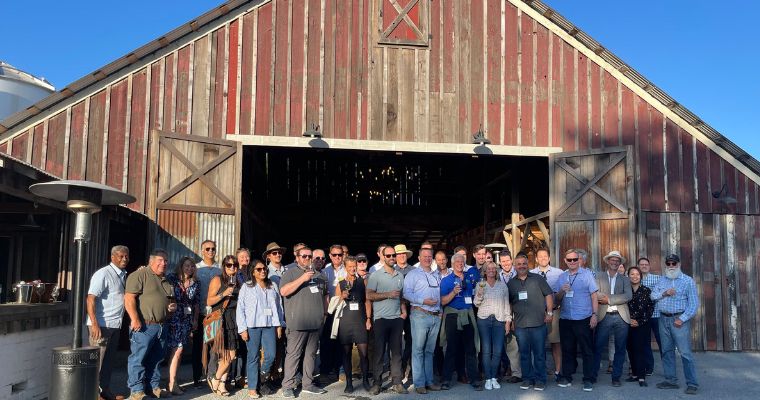
Sonoma County Winegrowers' Farm of the Future, reinforcing the organization's position as a global leader in sustainable agriculture. (Photo: Sonoma County Winegrowers)
The Climate Adaptation Certification, a first-of-its-kind for agriculture, from the California Land Stewardship Institute (CLSI) is for growers who are interested in improving their sustainability to specifically focus on climate practices that reduce their Greenhouse Gas (GHG) emissions and sequester carbon. Five years ago, Sonoma County Winegrowers became an exclusive pilot participant with CLSI in the Climate Adaptation Certification program marking the first time participating growers could obtain certification for a comprehensive greenhouse gas reduction and carbon sequestration program. The success of their pilot program provided insights into the development of the new certification program including the best management practices for growers to provide the highest levels of carbon sequestration and the most efficient models to use in calculating GHG emissions and carbon sequestration. The certified climate plan defines carbon sequestered in soil, trees, and hedgerows in relatable terms of car emission offsets.
The certified climate plans propose implementable changes such as planting cover crops; using limited tillage; installing hedgerows or trees; composting; and reducing nitrogen fertilizer. Over the past few years, CLSI has created customized local farm plans based on soil type, microclimate, elevation, history of the land, and farming practices that meet the certification requirements. This program recognizes that each ranch and farm will have a different ability to sequester carbon and reduce GHG based on their soil type, climate, and farming goals, which is why custom plans with different scenarios are critical to the success of climate-smart farming.
I have the best job in the world, so there is a lot to celebrate personally and professionally. The “living in the moment” philosophy has been the foundation for our partnerships and collaborations. It is about never underestimating how a small idea or the start of a conversation can lead to a life-changing impact. One of the best examples of this is our partnership with Alaska Airlines. Back in 2021, we were connected with the SVP of Public Affairs & Sustainability from Alaska Airlines who was in Sonoma County for their board meeting. That conversation over a glass of wine has literally transformed lives as Alaska Airlines, for the second year in a row, is giving “the gift of flight” to 20 of our vineyard employees who are part of our Foundation’s Leadership Academy so that they can go to Washington, D.C. and host the Congressional Wine Caucus. For these men and women who work in our vineyards, it is their first trip to D.C., for many it is their first time on a plane and their first time to experience our Nation’s Capital and share their stories directly with Members of Congress. It is a once-in-a-lifetime experience that positively impacts their lives and their families.
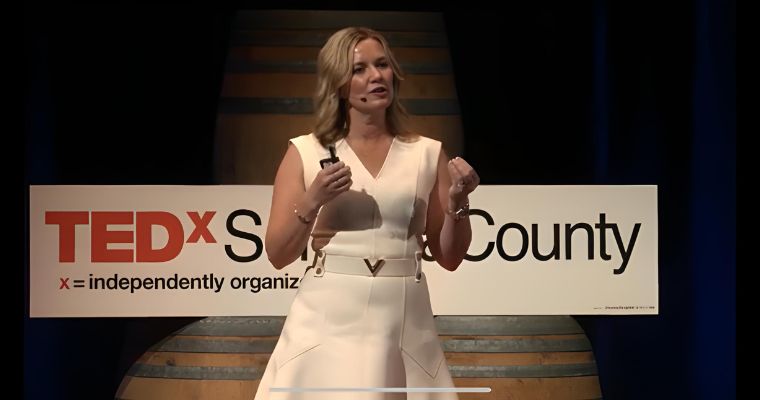
Image: Karissa Kruse’s 2022 TEDxSonomaCounty talk called, “Drink the Good Stuff.”
I always appreciate the perspective of the farmers who have been farming for decades, as they understand just how cyclical farming is and winegrape growing. In a 12-month period we can move from drought conditions to flooding. Mother Nature, the one thing that cannot be controlled, will always provide the biggest challenge for our growers.
In addition to climate, the cost of doing business is incredibly challenging, especially for our smaller, family farmers. Many grape contracts with wineries are long-term, so business cost increases are difficult to manage in the short term, whether it is for labor, supplies, equipment, or compliance, growers often take the hardest hit.
This is why our Farm of the Future effort and the goal of “going on the offense” is so important in combination with partnerships and collaborations that help us be better prepared, flexible, and adaptable to an increasingly complex climate. Through collaborations, we can also pilot and create the case study for new technology or equipment, so we can better understand the return on investment and help our growers make the best decisions for their specific business. In the long run, economic sustainability may be the most important. If you are not able to stay in business, you cannot support your employees or be stewards of the land. Most of all, it is important to be continuously improving. Our grape growers and vineyard employees are the secret sauce of our region. They are dedicated, humble, and incredibly forward-thinking!
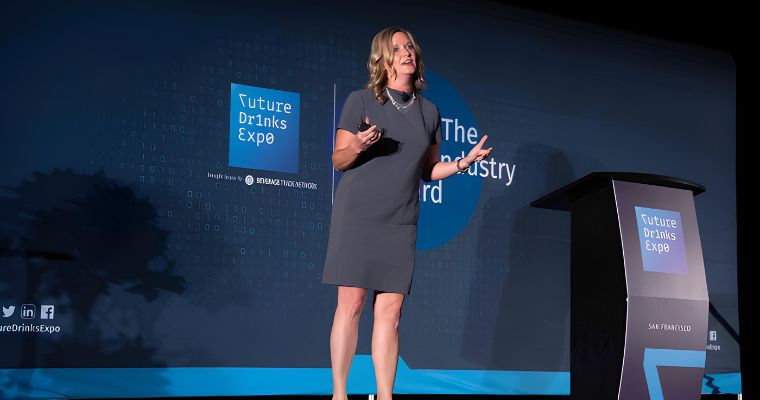
Image: Karissa Kruse at 2022 Future Drinks Expo talking about sustainability.
Collaboration is absolutely at the heart of everything we do! We are a small organization, so it is critical for us to work with others to tell our stories, share resources, and learn from each other. One of Sonoma County Winegrowers’ longest partnerships is with Landry’s. Landry’s is the largest on-premise buyer of Sonoma County wines in the U.S. They are incredibly important in the success of our wine region. Landry’s includes 600 restaurants, hotels, and entertainment venues, with recognizable brands such as Morton’s Steakhouse, Mastro’s Steakhouse, Chart House, and Del Frisco’s among others.
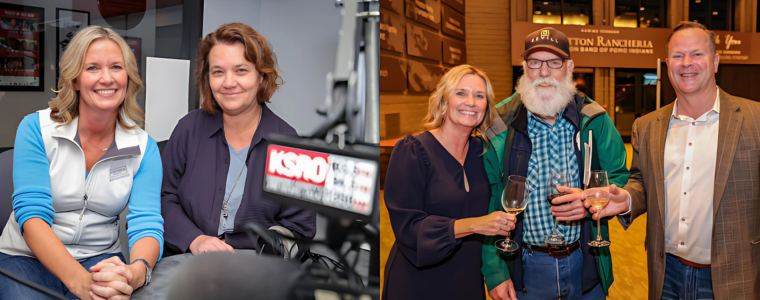
Image: (Left) Karissa with noted Journalist Virginie Boone at the "Good Stuff" Radio Show; (Right) Karissa with Duff Bevill and Sean Sundberg from John Deere.
This partnership started through meeting a key member of their team at one of our wine events in Texas over ten years ago and fostering a mutually beneficial relationship that has included partnering on wine festivals, supporting education for wine leaders and general managers, and supporting promotions that help their restaurants and our wineries. The key has been to curate events and programs that help build and support both of our businesses. Most recently, they connected us with the Houston Rockets basketball team, as they are owned by the same owner as Landry’s Inc. This new sports partnership has incredible potential to bring Sonoma County wine to new consumers and sports fans in one of the top five wine markets in the country.
As we look ahead, we have two primary goals for Sonoma County Winegrowers:
1) continue to elevate the brand Sonoma County on the global stage and
2) continue our sustainability leadership with our Farm of the Future Initiative.
These goals share a common approach to success – partnerships and collaboration. We will continue to build our current relationships and are always open to new partnerships that help support our farmers and our wine community.
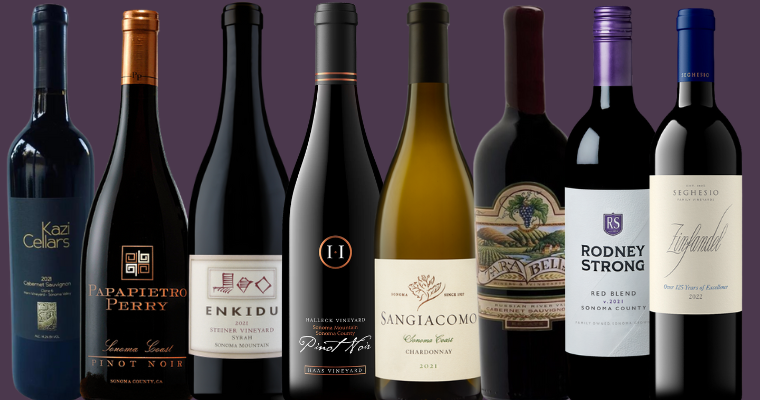
Image: Winners of 2024 Sommeliers Choice Awards from Sonoma County - (L-R) 2021 Cabernet Sauvignon Clone 6 Horn Vineyard - Sonoma Valley, Papapietro Perry Sonoma Coast Pinot Noir 2021, 2021 Syrah Steiner Vineyard, Sonoma Mountain, Pinot Noir Sonoma Mountain Haas Vineyard, 2021, 2021 Sonoma Coast Chardonnay - Sangiacomo Vineyards, Tara Bella Winery 2019 Cabernet Sauvignon Sonoma County, Sonoma County Red Blend and Seghesio Family Vineyards Sonoma Zinfandel
As Sonoma County Winegrowers continues to set benchmarks in sustainability and innovation, Karissa Kruse's leadership remains pivotal. The journey from achieving 99% certified sustainable vineyards to pioneering climate adaptation practices showcases a commitment to environmental stewardship and community support. With a clear vision for the future, rooted in collaboration and continuous improvement, Sonoma County Winegrowers is poised to remain at the forefront of the global wine industry, inspiring others with its achievements and forward-thinking approach.
In conversation with Malvika Patel, Editor and VP, Beverage Trade Network
Enter your Wines now and get in front of top Sommeliers, Wine Directors, and On-Premise Wine Buyers of USA.
